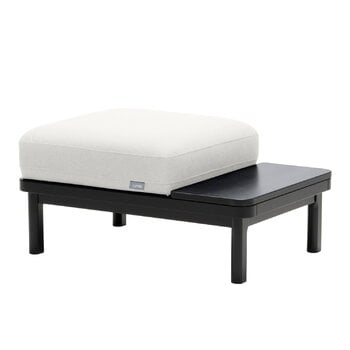Lundia’s Hetki ottoman has a modern, minimalist design that draws on the traditions of Nordic design and woodworking. The Hetki ottoman features a beautiful solid wood frame and a generous, upholstered seat cushion. Thanks to the small tabletop next to the cushion, you can also use the ottoman as a coffee table.
Designed by Petteri Häkkinen, the Hetki ottoman makes a perfect pair for the Hetki sofa bed, and its calm, simple appearance is easy to match with any contemporary interior. The Hetki ottoman is manufactured in Finland and is available in several different upholstery options.
This ottoman is upholstered in GRS-certified Greenway fabric made from cotton surplus from the fashion industry. The recycled fibres give the fabric unique colours which may vary slightly from the images shown.




